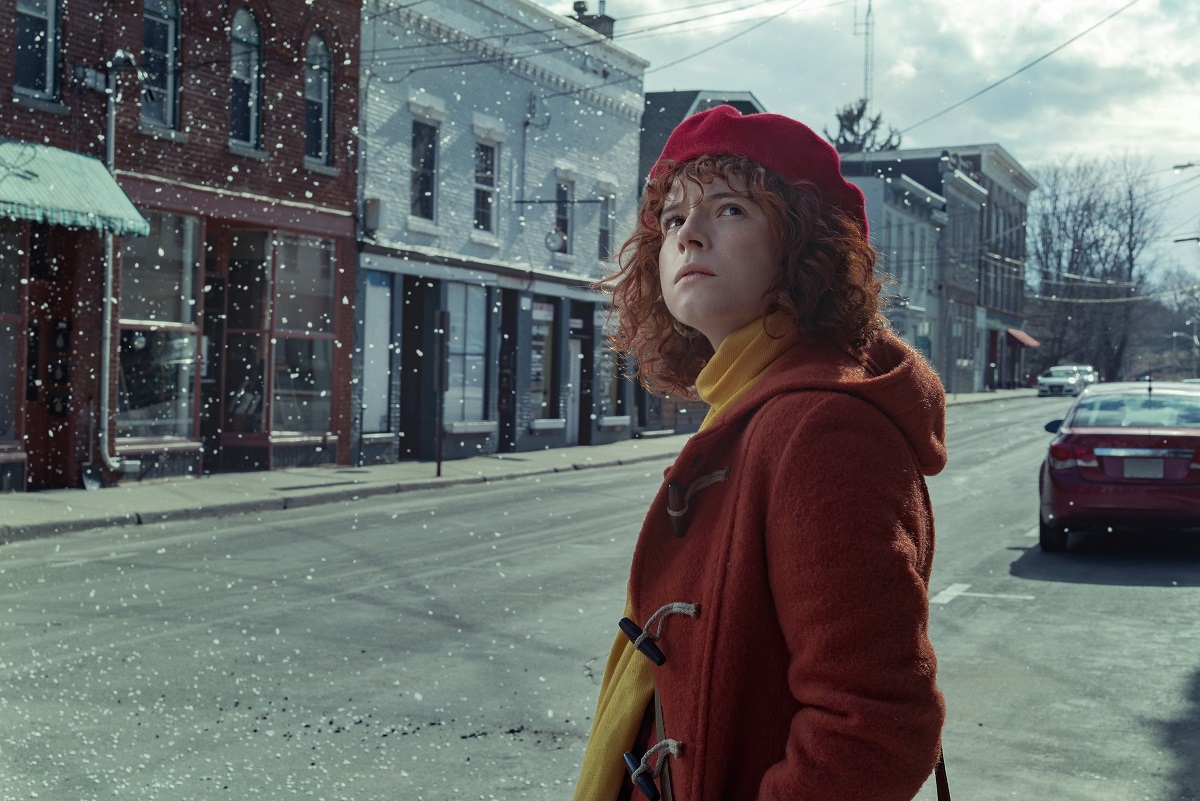“Jake needs to see me as someone who sees him. He needs to be seen, and he needs to be seen with approval. Like that’s my purpose in all this, in life.” — The Young Woman
As a teenager, one of my biggest goals was having a boyfriend. It wasn’t just to get attention or companionship. I wanted nothing more than to please a boyfriend and seem different from all the other girls. I wanted to be the quintessential cool girl, as described by Amy Dunne in “Gone Girl.” I molded myself into something different with each new partner. I was just what people wanted me to be.
I lost my sense of self as my identity began to form around another person. I shape-shifted into a girl who likes playing video games all night, likes watching football, knows exactly what to say in every situation, and loves each and every one of their friends. This is a dilemma amplified in Charlie Kaufman’s “I’m Thinking Of Ending Things,” but what’s even more toxic in the film is our narrator is nothing but a construction of a lonely old man’s imagination. The Young Woman, played by Jessie Buckley, is not one woman, but an amalgamation of characteristics that this particular man finds (or has found) desirable in a partner. Despite being trapped in this mental prison, the Young Woman is able to find empowerment, revealing the fallacies of her creator’s shallow vision of what she could be.
As good partners are often expected to do, the Young Woman often agrees with Jake to placate him and make him happy. Yet, underneath her plastic smiles, she also reveals that she is thinking of ending their relationship. From the first moments of the film, her character is rooted in revolution and the desire to untangle herself from Jake. While this can be interpreted as Jake’s own inner dialogue about why women have left him, this film is also about the Young Woman becoming self-aware and realizing her role in this fantasy.

The Young Woman does not have one fixed identity as her names, outfits, and careers constantly shift. She’s Lucy, Louisa, Lucia, or Ames. Her identity is a swirling maelstrom that changes by the minute. Like the Young Woman, my interests, my music taste, and my style were often dictated by the boy I liked. I lost sight of who I was, feeling like a blank canvas that was constantly changing appearance in the name of what I thought was love. Neither my nor the Young Woman’s identities were ever stable. She even plainly states, “Jake needs to see me as someone who sees him,” a sentence that encapsulates the dangers of being a fantasy.
The moment that signals a major shift in the Young Woman’s own awareness is when she ventures into the basement of Jake’s family’s farm. Jake tells her don’t go down there, as if he is hiding something. Despite his warnings, the Young Woman makes the choice to descend the stairs. There she begins to find clues that something is amiss, from the janitor’s uniform in the washing machine to the paintings that reveal they were not painted by her, but by Jake. In this basement, he has hidden his secrets that unlock who she truly is. Her reality is destabilized as she realizes that aspects of her personality came from Jake himself, just as I began to realize that my interests only stemmed from a partner.
Her experience in the basement is compounded when they travel to Tulsey Town to get frozen treats. As the Young Woman pays for their food, the cashier whispers an ominous warning, telling her that she could escape and not go with Jake. Jake’s own mind rebels against him. His memories try to save the Young Woman as if his subconscious wants to free her from his mind. The cashier is the tugging sensation in the back of my mind that wanted me so desperately to see the red flags of my relationships. In the vagueness of her warning, the cashier speaks to the deep uneasiness that comes from the realization that something was wrong and that I had lost sight of who I was.

The film’s ending is centered on Jake’s death but also on the Young Woman’s liberation. As soon as she walks into the light and vanishes, the man’s darkest thoughts truly begin to takeover with a dance number and a song from “Oklahoma!” Despite her shifting identities, she was Jake’s ideal person, a singular thing to attach himself to, who will, as she says, always see him with approval. Without the Young Woman’s reassuring presence, Jake can no longer rely on someone to ease his emotional pain and validate his existence—he loses his anchor. He begins to spiral as he tries desperately to fill in the gaps. Any semblance of narrative structure dissolves away and is replaced by a chaotic stream of consciousness.
In the Young Woman’s nonlinear journey through the maze of Jake’s mind, I saw myself as I traveled through a hazy labyrinth of anxiety. Kaufman is able to examine the complexity and confusion of existing solely as someone’s fantasy, as well as how relying on a fantasy dooms you to a life of disappointment. In the shifting of perspectives from the Young Woman to Jake, she has liberated herself, while Jake is left to scramble and reconstruct his psyche; he must reckon with his loneliness and his inability to recognize his own flaws. It is the ultimate break-up, the ultimate reclamation of identity.











